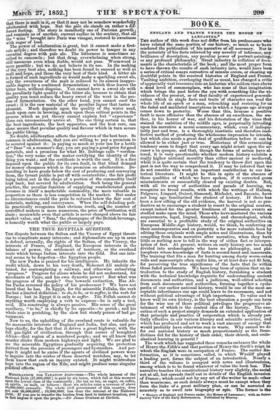THE TRUE EGYPTIAN QUESTION.
Tan dispute between the Sultan and the Viceroy of Egypt threat- ens to complicate many interests; and diplomatists are up in arms to defend, severally, the rights of the Sultan, of the Viceroy, the interests of France, of England, the European interests in the balance of power, the settlement of territory, or the overland route which brings Indian interests into the field. But one inte- rest seems to be forgotten—the Egyptian people.
The new Pacha is praised for his intelligence. He inherits the credit which, down to his very death, Mehemet All unduly ob- tained, for contemplating a railway, and otherwise subserving "progress." Progress for aliens whom he did not understand, for merchants at Cairo, and his own dynastic power ! But what was the progress of the people P One towards extinction. Has Ab- bas Pacha reversed the policy of his predecessor P We have not heard that he has. In Egypt, for the miserable Fellaha, the verb has but a limited definition : to do, to be, or to sufer, is the verb for Europe ; but in Egypt it is only to suffer. The Fellah cannot do anything worth employing a verb to express—he is only a tool, used. His construing is always passive. His sense of the great auxiliary, " to be," is chiefly by its opposite—to perish ; and his whole race is perishing, by the slow but steady poison of bad go- vernment.
Now to us, the upholding of the overland route is valuable for the mercantile interests of England and India, but also, and per- haps chiefly, for the fact that it drives a great highway, with the full gas-light of civilization, through that corner of benighted Africa—that region of a murdered people ; and we all know that murder slinks from modern highways and light. We are glad to see the miserable Egyptians gradually acquiring the protection derived from the presence of passengers and bystanders. And per- haps it might not be amiss if the agents of civilized powers were to inquire into the wishes of those deserted wretches, nay, to let them know that such an inquiry existed.. It might rehltroduce hope into the region of the Nile, and might produce some singular political effects.


























 Previous page
Previous page